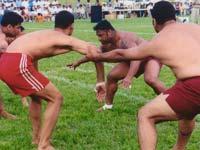Kabaddi connection to human traffickers

Around 90 players who came to Canada to play the ancient Indian sport of kabaddi ,have vanished and never returned home.
Every year, several kabbadi players from the state go to Canada to play in the local tournaments. However, last year the number swelled as the Canadian government started special visa process to fast-track the visa of kabbadi players from Punjab. The move resulted in very high number of players from Punjab going to play matches there.
Last year, a record 670 visas were issued to the players from Punjab out of which 91 never returned and 27 players filed refugee claims. About 152 kabbadi visas were issued in 2009 and 298 in 2010. Although some players have disappeared in Canada even in the past, but this is the first time that so many have gone missing.
The vanishing act by such high number of players forced the Canadian government to stop the special process for kabbadi players. However, with the beginning of new kabbadi season this summer from May to August in Canada, the players nursing the dream of playing Canada are most worried.
According to Punjab Kabaddi Association secretary Gurdeep Singh Malhi, the main reason for the vanishing of such huge number of players is that the kabbadi tournaments in Canada are organised by private clubs. Punjab Kabbadi Association is not involved with these tournaments. He says that private clubs in Canada, which have patronage of Indian origin politicians, call Indian players to participate in these tournaments.
Malhi blames the involvement of people who have nothing to do with the kabaddi. The people who take kabaddi teams to Canada select many non-players, sometimes their relatives, with the purpose of trafficking, Malhi said. The Punjab Kabbadi Association has taken teams to various parts of the world in the past, but the boys of our teams have always returned.
Jason Kenney, Minister of Citizenship, Immigration and Multiculturalism, recently hosted a news conference to discuss the issuance of visas to overseas Kabbadi players in the past, and announced the suspension of the visa program for 2012.
According to Kenney, the government had created a special visa program for Kabbadi players from overseas to travel and participate in the sports clubs and federations in Canada, especially during the summer season. Furthermore, the process allowed clubs to provide credentials through federations to nominate players to come to Canada.
“Consequently, we issued over 600 Kabaddi player visas last year in 2011, however we found some very serious integrity problems in the program. We found that over 90, rather roughly 100 did not confirm their return to India and Pakistan at the end of this, their authorized period in Canada and we received a number of asylum claims. I believe over 10 of these players have gone on to make refugee claims, typically in Montreal for some peculiar reason,” said Kenney.
“We received, started to receive complaints from the local police agencies in Peel, Surrey, Calgary and elsewhere about some players apparently being involved in criminality, including allegations of involvement in narcotics, abuse of women in Canada and other problems of criminality. And we were very disappointed with the conduct of many of these individuals who benefited from this streamlined visa program.”
In addition, Kenney has received feedback from the Punjabi community, who are “generally quite disturbed with how Canada’s generosity was abused” and he says the number of Kabaddi clubs and federations in Canada has grown to seven competing federations, which “further complicates our ability to administer such a program.”
Kenney has suspended the streamlined visa program for Kabaddi players this year, and for overseas players, they will have to apply for a regular visitor visa through “our missions overseas and their application will be considered in the same way as everyone else.”
“They will get no special consideration or treatment because they’re coming into a Kabaddi club. They will have to demonstrate like everyone else does, that they have an intention to return at the end of their authorized period, that they have ties back to India or wherever their home country is and they’ll have to get the visa in the same normal process as everyone else.
Kenney went on to add that he has asked his parliamentary colleagues to work with the Kabaddi federations “to encourage them to get their act together, to try to move towards a more cohesive governance of the sport in Canada, I would hope ideally with one credible national federation made up of credible, well governed.
Leave a comment









